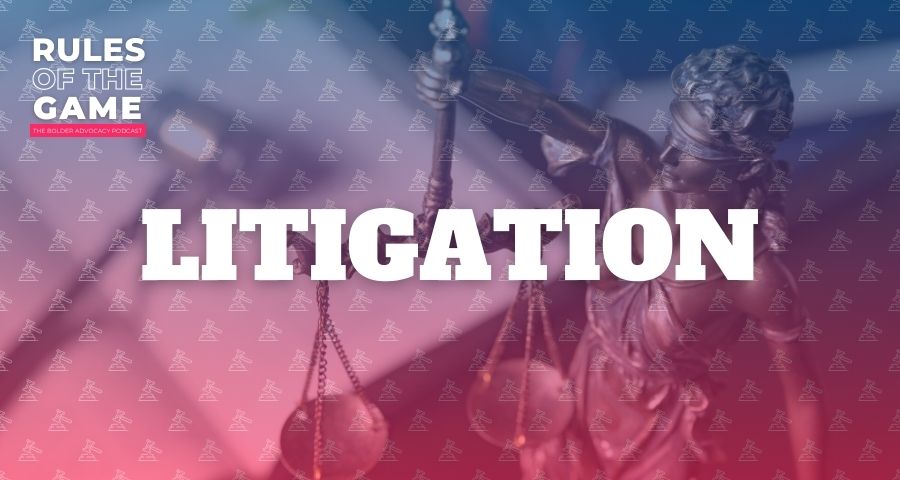As we’ve talked about on previous editions of the pod, advocacy includes a wide array of different options to help change things for the better in our communities. One of the more important, but less discussed methods, is litigation. On this episode, we dive into the role litigation plays in nonprofit advocacy, its treatment under the law, and things to think about if your nonprofit is looking to use this tool for good.
Our Attorneys for this Episode
About this Episode
- Litigation as an advocacy tool (citizen suits, appeals, amicus briefs etc.)
- Treatment under tax law
- Relation to charitable purpose
- Not lobbying under 501(h) or insubstantial part definitions
- Not limited by IRS / Tax Code
- Spectrum of engagement
- Publicly supporting (or opposing) another organization’s litigation
- Example: Letter of Support signed by over 225 organizations in support of the Fearless Foundation (currently under legal attack for a program that supports the funding of black female entrepreneurs)
- Amicus briefs
- Example: In 2018, Alliance for Justice and Council on Foundations filed a joint amicus brief in the case of Parks Foundation vs. Commissioner of Internal Revenue arguing for a narrow interpretation of what it means to “express a view on specific legislation” when determining whether a nonprofit’s activities constitute lobbying.
- Representing clients
- Example: Lambda Legal focuses on litigation in support of LGBTQ+ rights and individuals living with HIV/AIDS. They represent clients in cases involving discrimination, marriage equality, and transgender rights, participating in all stages of litigation. Currently representing AFJ member PFLAG in a Texas case.
- Litigating as a plaintiff (citizen suits, standing)
- Example: Clean Water Act citizen suits suing polluters for discharges without a permit – we’ll talk more about this specifically later
- Standing: must show harm to the organization or members of the organization
- Publicly supporting (or opposing) another organization’s litigation
Things to Consider
- The law (who are the experts in relevant area of law?)
- The courts (judges matter!) – For more check out AFJ’s federal and state court resources on our website.
- Capacity (internal or external)
- Staff and resources (funding and time)
- Reputation with funders, members, public
- In-house or outside counsel
- Media impact and PR
- Insurance (not sure if this is too deep in the weeds?)
Examples
- Earthjustice (AFJ member) + Waterkeeper Alliance
- Lawsuits typically target government agencies, industrial polluters, and corporations to enforce existing environmental laws
- Clean Water, Clean Air Act, National Environmental Policy Act (NEPA), Endangered Species Act, Resource Conservation and Recovery Act (RCRA), Safe Drinking Water Act
- Legal Services Corporation & regional public interest law; Legal Aid at Work, Legal Aid Association of CA, CA Women’s Law Center, Tzedek
- Innocence Project of Texas (member of Innocence Network, which is also home to AFJ Member, Innocence Project)
- Litigates claims of actual innocence made by individuals convicted of serious crimes in Texas.
- Example: Former client, Johnny Pinchback, wrongfully convicted of sexual assault of two teenage girls in Dallas (proven innocent via DIA testing) and formally exonerated via post-conviction habeas corpus litigation
- Stories of clients like Johnny led to increased public awareness of wrongful convictions and even legislative reforms
Resources
- Issue Advocacy: Why Courts Matter
- State Courts Hub
- AFJ Database of reports on federal judges and judicial nominees

